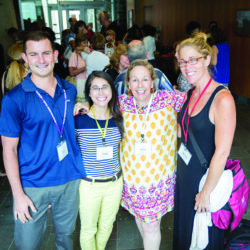By Mandy Stangeland, MS, IECA Associate (CA)
Like most of the newer independent educational consultants (IECs) I have met, I jumped into starting my practice without any business experience. I had the knowledge coming from the college side of the admissions desk, but running a business was like speaking a foreign language to me. I took some certificate classes from UC Irvine, which was helpful, but I was still missing something, and I couldn’t quite put my finger on it.
Then I signed up for the IECA Summer Training Institute (STI) in 2018. I had read about it and it seemed like the logical next step for someone like me who had a year of experience under my belt but no real traction in my business. I quickly discovered the value in the program and realized what it was I had been missing: camaraderie.
The first thing I noticed was how I felt being on a college campus surrounded by like-minded individuals with similar goals. I thought “Wow, this is how our students must feel on their first day of college.” The IECA staff was there to greet us and was two steps ahead of anything we could possibly need (including the aspirin I required one morning for the unexpected and very unwelcomed migraine).
Our cohort was quick to bond over our experiences and our insecurities, which made everyone feel very comfortable. We were able to easily relax and soak in the abundant amount of information that was not thrown at us but spoon-fed carefully to make sure we relished every bite. There were lectures, break out sessions, special topics, and even special guests flown in from all over the world to help us achieve what so many in this industry have already mastered. I was blown away by the faculty’s willingness to share what had and had not worked for them. They even supplied us with examples of contracts, price sheets, and breakdowns of how they work with clients. What I thought would be impossible to acquire from my competition was delivered to me in a two-inch thick binder that has been worth its weight in gold.
The message was clear: there is plenty of business to go around and we want you to succeed. Our success as business owners is reliant on our success as an industry. When we support each other, we all win, especially the students.
Knowing that IECA and my fellow members have my back gives me the confidence I need to go forward. The people from my STI cohort are more than colleagues, they are friends. We share our best tips with each other, consult with each other based on our niche or expertise, and room together at conferences (often saving a bundle on travel expenses). When there is an IEC event, we often seek each other out via a group text or through our private group Facebook page so we can claim a table and settle in quickly. We have even adopted some honorary members because the goal is to never be exclusive. It’s the inclusive culture of IECA that brings so much value to this industry. And for me, that’s how I know I have chosen the right fit profession.
Mandy Stangeland, Wise Owl College Consulting LLC, can be reached at mandy@wiseowlcollege consulting.com.
2019 Summer Training Institutes
July 9–July 13
Claremont McKenna College, Claremont, CA
July 30–August 3
Swarthmore College, Swarthmore, PA
Visit https://link.IECAonline.com/sti for more information.



